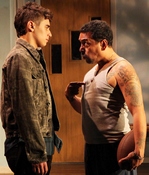SITE GUIDE
SEARCH
REVIEWS
REVIEW ARCHIVES
ADVERTISING AT CURTAINUP
FEATURES
NEWS
Etcetera and
Short Term Listings
LISTINGS
Broadway
Off-Broadway
NYC Restaurants
BOOKS and CDs
OTHER PLACES
Berkshires
London
California
New Jersey
DC
Philadelphia
Elsewhere
QUOTES
TKTS
PLAYWRIGHTS' ALBUMS
LETTERS TO EDITOR
FILM
LINKS
MISCELLANEOUS
Free Updates
Masthead
A CurtainUp Review
Basilica
| "The only person you have to face is yourself."—Joe
|

Jake Cannavale and
Felix Solis
(Photo: Sandra Couvert) |
But occasionally you run into a show where one part is so good it almost makes the quality of the other ones insignificant. That's the situation with the Rattlestick Playwrights Theater's new play Basilica, running now at the venerable Cherry Lane Theatre. It's sometimes frustrating, occasionally brilliant and deeply compelling.
The play follows the life of the Garzas, a lower middle-class family trying to survive a painfully bad economy and the suffocating environment of San Juan, Texas. Lela (Selenis Levya) is the moral and human center of the family, holding together a mismatched pair of children — Jessica (Yadira Guevara-Prip) and Ray (Jake Cannavale of Showtime's Nurse Jackie fame), and her husband Joe (Felix Solis), a former high school football star who's fallen into an undeniable but comfortable rut of daytime work and nighttime benders at the local bar.
Despite Lela's influence, faith isn't easy to sell to the rest of the Garzas or their friends, and when Father Gil (Alfredo Narciso) returns to San Juan as its new pastor after leaving the town after high school, Lela finds herself as doubtful about the future as those who surround her.
The past is always prologue in this setting, and as the play progresses it becomes clear that escaping the pull of that past will be just as challenging as surviving the present. Accordingly, playwright Mando Alvarado is at pains to emphasize the ways each character needs to develop on his/her own terms. He is aided by a well-conceived physical environment (the excellent set by Raul Abrego ties together house, bar and church in a clever and provocative way) and solid directing from Jerry Ruiz, who trusts his actors enough not to interfere with their natural instincts and allows them to explore the limits of their characters.
This decision by Ruiz plays to the show's greatest strength: the cast is universally excellent, with even the comparably less important characters of Lou Helms-Garza (Rosal Colon) and Cesar Cantu (Bernardo Cubria) made intriguing and real by their performers. Cannavale is solid as Ray, who feels out of step both with his friends and family, and Guevara-Prip renders the yearning loneliness of twelve year old Jessica with intelligence and compassion. Levya turns in a powerful performance as Lela, and Narciso is equally compelling as Father Gil. His sermon towards the end of the production, delivered with equal measures of anger and self-loathing, is utterly riveting.
But the star of the show is Solis, whose mixture of humor, rage, and machismo married with deep compassion and a sense of responsibility is pitch-perfect. It would be easy to make Joe into a caricature of drunken excess; instead he comes off as completely human, and his performance, including the powerful final scene, is an absolute triumph. This is one of the best performances I've seen, and I don't make that statement lightly.
It's a shame,then, that for all of the interest generated by the characters, that the plot is relentlessly predictable, and the twists generally obvious from a long way off. The staged production departs fairly significantly from the original script of the play on several occasions, and I'm not convinced the changes help. But most of all, I'm not convinced Alvarado's story really does justice to the people within it. At its core this is really a not very subtle melodrama, and that seems like an unfortunate waste of both time and talent.
Yet as odd as it sounds, the acting is so good that I'm inclined to overlook my significant reservations with the story. If you can focus on the characters themselves rather than the overarching plot to which they're forced to conform, you'll find a compelling representation of humanity at the Cherry Lane Theater.
|
Basilica By Mando Alvarado Director: Jerry Ruiz Cast: Jake Cannavale (Ray Garza), Rosal Colon (Lou Helms-Garza), Bernardo Cubria (Cesar Cantu), Yadira Guevara-Prip (Jessica Garza), Selenis Levya (Lela Garza), Alfredo Narciso (Father Gil), Felix Solis (Joe Garza) Set Design: Raul Abrego Costume Design: Carisa Kelly Lighting Design: Burke Brown Sound Design: Jane Shaw Running time: Two hours with a fifteen minute intermission The Cherry Lane Theatre, 38 Commerce Street, (212) 989-2020 Website: http://cherrylanetheatre.org From 5/9/13 to 6/16/13, opening 5/23/13 Tuesday-Saturday @ 8 p.m., Saturday @ 2 p.m., Sunday @ 3 p.m. Tickets: $76.00 Reviewed by Dr. Gregory A. Wilson based on May 21st press performance |
| REVIEW FEEDBACK Highlight one of the responses below and click "copy" or"CTRL+C"
Paste the highlighted text into the subject line (CTRL+ V): Feel free to add detailed comments in the body of the email. . .also the names and emails of any friends to whom you'd like us to forward a copy of this review. Visit Curtainup's Blog Annex For a feed to reviews and features as they are posted add http://curtainupnewlinks.blogspot.com to your reader Curtainup at Facebook . . . Curtainup at Twitter Subscribe to our FREE email updates: E-mail: esommer@curtainup.comesommer@curtainup.com put SUBSCRIBE CURTAINUP EMAIL UPDATE in the subject line and your full name and email address in the body of the message. If you can spare a minute, tell us how you came to CurtainUp and from what part of the country. |



 Anything Goes Cast Recording
Anything Goes Cast Recording Book of Mormon -CD
Book of Mormon -CD